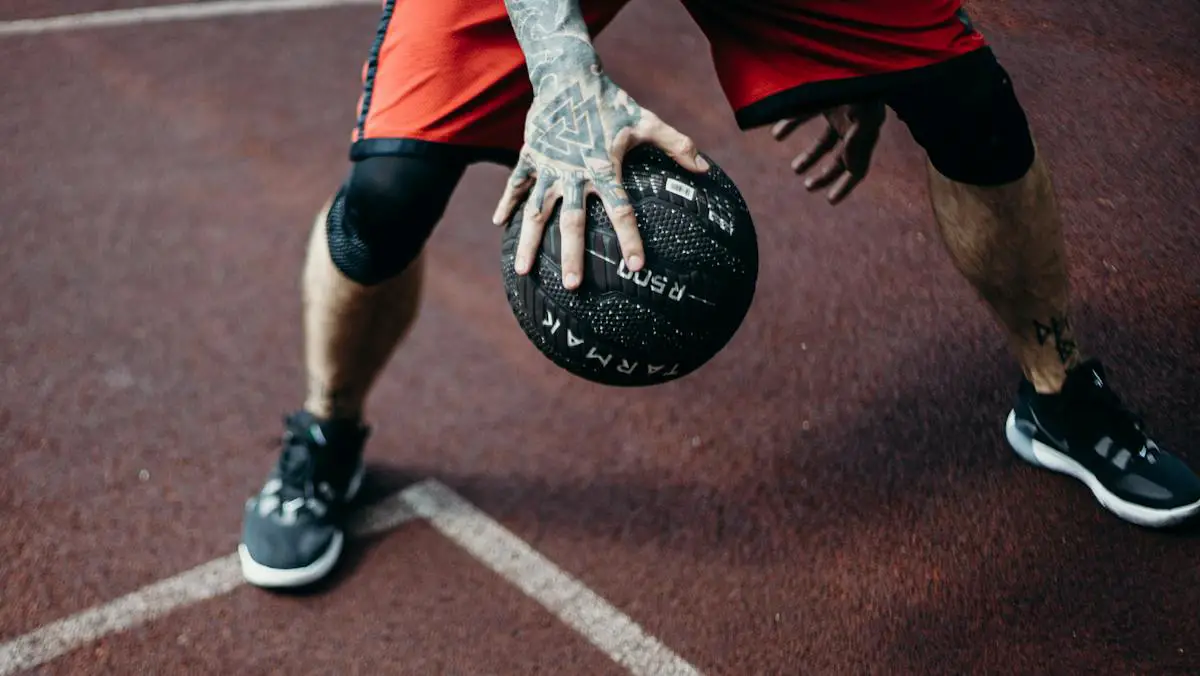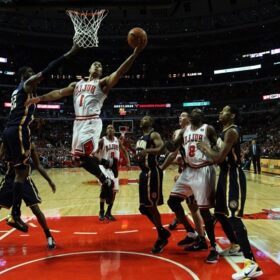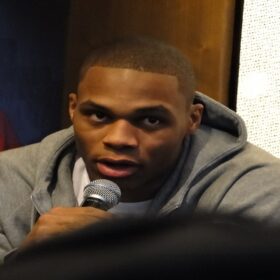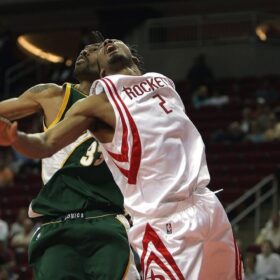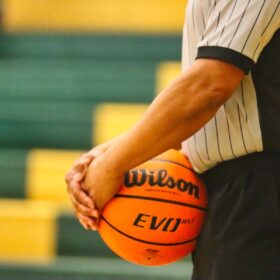According to the U.S. Center for Disease Control and Prevention (CDC), autism is a broad-spectrum development disease. The disease usually begins before age three and can affect a person’s entire life.
Many autistic people struggle to behave, interact, learn, and interact with others. As such, you may be surprised that there are NBA players with autism.
4 Notable NBA Players With Autism
Let’s look at these four standout NBA players with autism.
Tony Snell
Birthdate: November 10, 1991
Listed weight: 213 pounds
Height: 6 feet 6 inches
NBA Draft: 2013 first round, 20th overall pick
Position: Small forward/Shooting Guard
Early Days
Like most players, Tony Snell started his basketball career by excelling in high school sports. Snell attended and played for Martin Luther King High School (California) before moving to Westwind Preparatory Academy, Arizona.
Snell committed to playing for the University of New Mexico in 2009 while still in high school. In 2010, Snell joined the university and started playing for them.
Snell was a hit from the start. He played all but one game in his debut season for the university. He went on to win many accolades with them over the years.
Professional Career
Snell has played for many professional teams over the years. He started with the Chicago Bulls, which facilitated his NBA draft in 2013.
Over the years, Snell has also played for the Milwaukee Bucks, Portland Trail Blazers, Detroit Pistons, Atlanta Hawks, and the New Orleans Pelicans. He has been playing for the Maine Celtics since January 2023.
Mental Health Issues
Snell has revealed that he has always known that he is different from others. For example, he says he was always a loner growing up and couldn’t connect with others easily. However, it wasn’t until the doctors diagnosed his son with autism that Snell thought to seek a professional diagnosis for himself.
Though the diagnosis confirmed his worst fears, Snell claims it made sense. He reasons that the late diagnosis helped his NBA career. Snell suspects that an early diagnosis might have messed up his playing psychology.
Check out this video of Snell’s basketball mastery.
Royce White
Birthdate: April 10, 1991
Listed weight: 260 pounds
Height: 6 feet 8 inches
NBA Draft: 2012 first round, 16th overall pick
Position: Power forward
High School Basketball Career
Royce White played for two high school teams in his early days. He started by playing for DeLaSalle High School in (Minnesota). He led the school to a 19 – 8 record in his sophomore year. White also participated in LeBron James US Skills Academy and The Nike Global Challenge during his DeLaSalle days.
After DeLaSalle, White went to Hopkins High School in (Minnesota) for his senior years. He continued with his winning ways at Hopkins. He received recognition as one of the state’s best players and several scholarship offers.
College Basketball Career
White briefly attended the University of Minnesota before transferring to Iowa State University. In 2012, while at Iowa State, White finished the basketball season with leading statistics in points, assists, steals, blocks, and rebounds.
Professional Basketball Career
The Houston Rockets drafted White on June 28, 2012. Many considered him a ‘mystery pick‘ due to several issues in physicality and his personal life.
Houston Rockets tried to assign White to its D-League team, Rio Grande Valley Vipers, without much success. A few years later, the Sacramento Kings signed White and promptly assigned him to their D-League team, Reno Bighorns.
White didn’t last long at the Sacramento Kings and eventually left the NBA. He then signed for the London Lightning of NBL Canada.
He had a lot of success with the London Lightning and was the most valuable player (MVB) in 2017. He signed for Auxilium Torino of Italy after his London Lightning days but never played for them.
Mental Health Issues
Many people first became aware of Royce White’s mental health issues during his years at Iowa State University. White revealed that he had a severe fear of flying.
In fact, White preferred traveling by bus to most games while his teammates flew. His anxiety continued into his professional players. The mental health issues and associated medication affected his career.
White has since become a mental health advocate. He has also started a foundation focusing on mental health conversations and advocacy, especially in the sporting industry.
Here are a few highlights showcasing White’s prowess in his playing days.
Gary Neal
Birthdate: October 3, 1984
Listed weight: 210 pounds
Height: 6 feet 4 inches
NBA Draft: 2007 (Undrafted)
Position: Shooting guard
Early Days
Gary Neal attended and played for two high schools in his early years. He played for Aberdeen High School (Maryland) for three years before enrolling at Calvert Hall College High School (also Maryland). It was at Calvert Hall that Neal played in the Baltimore Catholic League.
After high school, Neal joined La Salle University (Pennsylvania) and won Rookie of the Year as a freshman. He transferred to Towson University (Maryland) after two seasons.
He went on to garner several accolades with Towson University. For example, he was only the fourth player to score at least a thousand points with two schools in NCAA history.
Professional Career
The NBA did not draft Neal even though he was eligible for the 2007 draft. Neal played for several European teams as an undrafted player before coming to the NBA with the San Antonio Spurs.
Neal had a stellar career at San Antonio Spurs. For example, he created a record for the most three-point shots by an undrafted player in a single game.
After separating from the San Antonio Spurs, Neal went on to play for several American and European teams before getting into coaching. As of 2003, he is the head coach of his alma mater, Calvert Hall College High School.
Mental Health Issues
Doctors diagnosed Neal with autism at a young age. However, the diagnosis did not deter Neal from a long basketball career. His determination shows that mental illness is not an automatic disqualification from athletic prowess.
Check out these interesting highlights of Neal’s glory days.
Mahmoud Abdul-Rauf
Birthdate: March 9, 1969
Listed weight: 162 pounds
Height: 6 feet 1 inch
NBA Draft: 1990 first round, 3rd overall pick
Position: Point guard
Early Days
Mahmoud Abdul-Rauf’s parents named him Chris Wayne Jackson before he converted to Islam and changed his name. Abdul-Rauf had an interesting introduction to basketball because his discovery was accidental.
A middle school girl’s coach in Gulfport (Mississippi) discovered Abdul-Rauf’s skills on the playground during a lunch break. The coach eventually convinced Abdul-Rauf’s mother to let the young man play for the school.
After high school, Abdul-Rauf joined and continued his basketball career at Louisiana State University (LSU). He won several awards during his two-year stint. For example, he set the freshman scoring record with 53 points while playing against Florida.
Professional Career
The Denver Nuggets picked Abdul-Rauf while he was at LSU. Again, his prowess on the field led to several individual and team accolades. For example:
- He led the NBA league in free throw percentage two years
- He achieved the third-highest free-throw percentage in the league’s history
The Denver Nuggets traded Abdul-Rauf to the Sacramento Kings in 1996. He stayed with the Sacramento Kings for two years, followed by successive stints in several European countries.
Abdul-Rauf currently plays for the Big3, a small basketball league for former NBA and international players.
Mental Health Issues
Abdul-Rauf has grappled with mental health problems since his younger years. He got a Tourette syndrome diagnosis as a teenager. Tourette is a nervous system disorder characterized by unwanted sounds and repetitive movements.
Unlike many autistic people, Abdul-Rauf got his diagnosis as an adult. Fortunately, these issues never stopped Abdul-Rauf from having a stellar basketball career. He has since become a champion for autistic sportspersons.
Here is a link to some of Abdul-Rauf’s court highlights.
Conclusion
Clearly, there are NBA players who have suffered and some who are still suffering from autism, among other mental health issues.
The great news is that many autistic players didn’t allow autism to hold them back. Many of them are raising awareness for mental health issues among athletes.

